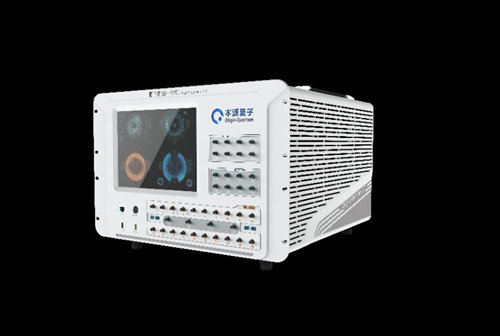Quantum computer ‘backbone’ developed
China to be world leading computing power in a few years: analyst

China's first quantum computer control system, OriginQ Quantum AIO, can provide the precise signal needed for the operation of quantum chips, process feedback information and compile computer programs. It was developed by a research team from Courtesy of University of Science and Technology of China and was launched on December 6 in Hefei, capital of East China's Anhui Province. Photo: Courtesy of University of Science and Technology of China
Chinese scientists have independently developed the country's first control system for future quantum computers, an indispensible part that can interpret the chips' signals and computing results, which was hailed by the developer as a significant step forward.
Guo Guoping, a key researcher in the development and research (R&D) team and professor at the Hefei-based University of Science and Technology of China, told the Global Times on Wednesday that "AIO allows the quantum chip to play out its maximum performance.
The control system is the "backbone" of a quantum computer while chips perform as the "brain." Quantum software and applications are equivalent to the "flesh and blood" of human beings, Kong Weicheng, a member of the R&D team, told China News Service.
China's system integrated control of quantum computing, which is usually carried out by separate machines, into one machine, [and] "it achieves the world's best results in processing feedback information from chips," said Guo, who is also a research fellow at the Key Laboratory of Quantum Information under the China Academy of Sciences.
But "the gap between China and the world will not be narrowed overnight," Guo said, noting that China launched its research on quantum computing some 10 years ago while world leading technology companies such as Google, IBM and Canada-based D-Wave have been working in this field for some 30 years. "They produced the best quantum chips," Guo said.
But he is confident that with leading research teams and increasing participation of domestic companies like Huawei, Alibaba and Tencent, "China will become a world leading quantum computing power in a few years."
China is investing in a national laboratory for quantum information science in Hefei, East China's Anhui Province, due to open in 2020, which "costs $10 billion," according to media reports.
The EU in 2016 announced a new 1-billion-euro ($1.13 billion) project aimed at developing quantum technologies over the next 10 years and placed Europe at the forefront of quantum technologies research, Newsweek reported.
Federal funding for quantum research in the US adds up to some $250 million a year, and the US has long dominated the field with support from tech giants like Google. But China "has closed the technological gap" with the US in quantum information science, according to a commission affiliated to the US Congress.
All the quantum computers are still prototypes and quantum computing is still in its infancy, according to Guo.
But a true quantum computer with cutting-edge quantum chips, effective control system, and functional software "is likely to be developed this century," Guo said.
Quantum computers dwarf classic ones in the amount of data they can store and process in the same period of time.

